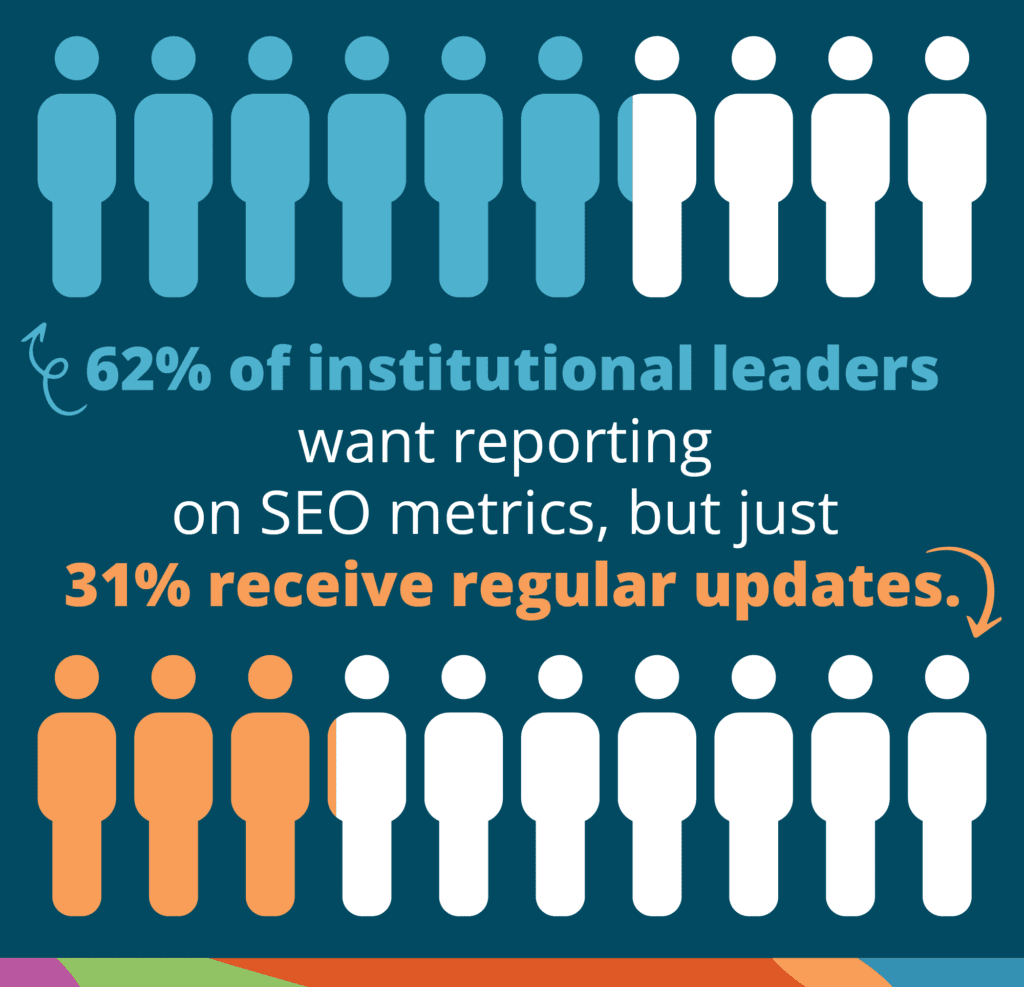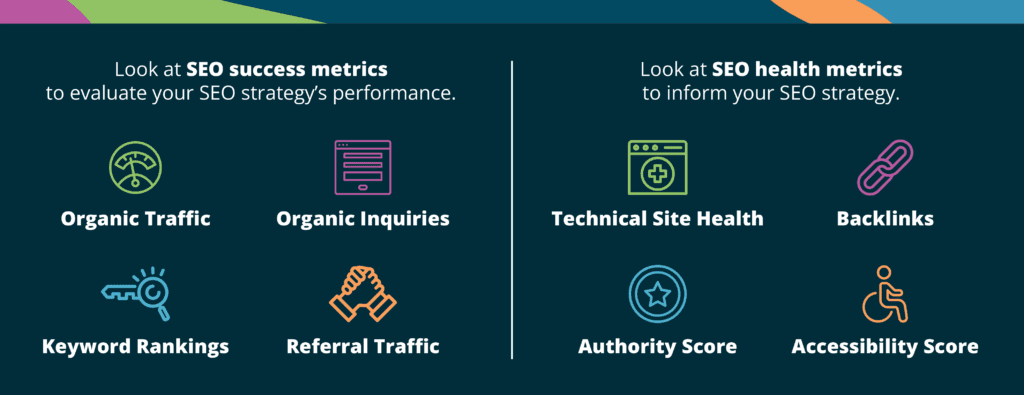Industry Insights
Valuable insights from UPCEA's trusted corporate partners.
Tracking the Right Higher Education SEO Metrics for Marketing Success
Key Insights
- Looking at SEO success metrics helps you evaluate your SEO strategy’s performance, while analyzing SEO health metrics lets you inform your SEO strategy.
- Institutional leaders want reporting on SEO metrics, but most don’t receive regular updates.
- From deans to marketing leaders to SEO analysts, various audiences need to receive and review different levels of data.
- It’s important to leverage SEO metrics to champion the necessary resources for improving SEO results.
Search engine optimization (SEO) is critical to driving new students to your higher education programs, particularly when targeting adult learners. Researching via search engines is a pivotal part of a potential student’s journey to discovering education options. And, it can even prompt them to consider education as the answer to their career growth needs.
Based on more than ten years of experience working with higher ed websites, we’ve found universities have an opportunity to improve their key programs’ search visibility by being more strategic with their SEO efforts.
We put our anecdotal experience to the test by partnering with UPCEA on a Higher Education SEO Research Study to understand members’ SEO perspectives, capabilities, and successes.
In this article, I dig into one key finding from the study: Institutional leadership often lacks SEO reporting. 62% of institutional leaders want reporting on SEO metrics, but just 31% receive regular updates.

This, and other data points in the study, highlight a self-perpetuating pattern:
Institutional leaders don’t hear regular reporting updates about marketing’s SEO efforts and outcomes. Therefore, they don’t push for or support SEO resources, meaning they don’t get SEO results.
To take it a step further, that final point then influences another piece of study data: 54% of institutional leaders indicate they aren’t satisfied with their PCO unit’s web strategy.
What higher education SEO metrics should you prioritize? Which metrics will have the greatest impact on your ability to drive enrollment? How can you use those metrics to advocate for more SEO resources?
Keep reading to learn:
- The difference between SEO success metrics and SEO health metrics
- Key SEO metrics for higher education marketing
- Tools for tracking SEO metrics in higher education
- Tips for setting goals and creating actionable strategies based on SEO metrics
Understanding the Role of SEO Success and Health Metrics in Higher Education Marketing
SEO success metrics vs. SEO health metrics
It’s helpful to distinguish between success and health metrics in order to use them strategically.
SEO success metrics are lagging indicators that tell you, after the fact, how well the SEO efforts you implemented are working. This could be how many people found your site via search engines or how visible you are in relevant searches on Google.
Look at SEO success metrics to evaluate your SEO strategy’s performance.
SEO health metrics are indicators of how well your site is set up to perform in search engines. They’re also gauges of what updates make your site more “SEO-friendly” and improve your rankings.
For example, health metrics tell you how easily Google can access and understand your site. Your rankings improve when you address the issues these metrics call out.
Look at SEO health metrics to inform your SEO strategy. These numbers help you understand updates you can make to improve your SEO results.

When you hone in on the right SEO metrics for higher education websites, you will:
- Make more effective and impactful changes
- Sharpen your focus on the outcomes that drive enrollment
- Avoid distractions of having too many variables to review
- Increase your confidence in your SEO strategy and results
- Be ready and able to speak to your success or your need for more resources
When your higher education marketing team doesn’t have the most important SEO data, it means you likely won’t prioritize SEO improvements.
By integrating SEO metrics into your marketing dashboards/reporting cadence, you increase your chances of affecting the numbers. And, when marketing and institutional leadership are in tune with those numbers, you can have more productive conversations about SEO resources and skills.
The Higher Education SEO Research Study indicates that reporting shortfalls lead to a lack of resource allocation. This ultimately means that marketing departments won’t have success generating inquiries or fueling enrollment.
Key SEO Metrics for Higher Education Marketing Effectiveness
A primary takeaway of our study is that institutional leaders agree on the importance of regularly receiving SEO-related metrics to inform their strategy, but don’t regularly receive updates.
Different audiences need to receive and review different levels of data. For example:
Deans or directors should review very high-level SEO success metrics delivered by the marketing/SEO team. These should tell the overall picture of how SEO gets programs in front of new students and how it impacts inquiries/enrollment.
Recommended SEO metrics to show deans and directors:
- Organic inquiries
- Organic traffic
- Specific wins for keyword rankings for key programs
Marketing leaders/the full team should review slightly more detailed SEO success metrics.
Recommended SEO metrics to show marketing leaders and the full team:
- Organic inquiries
- Organic traffic
- Keyword rankings for key programs
SEO team/individuals should look at both SEO success and SEO health metrics.
Higher Education SEO Success Metrics
We recommend the following key performance indicators to evaluate the success of your university’s SEO plan:
Organic Inquiries
What are organic inquiries? Organic inquiries include the quantity of inquiries from visitors who entered your site through the non-paid results on a search engine.
What do organic inquiries tell you? Is your SEO and overall marketing strategy driving qualified visitors to your website? This metric also includes people who enter your site by searching for you by name (a.k.a. “branded searches”), which is why it’s also an indication of your overall marketing funnel’s success — not just SEO.
Organic Rankings (a.k.a. Search Engine Rankings)
What are organic rankings? Organic rankings are your position on Google’s search results for certain keywords. The keyword rankings you should care about most are ones related to your programs and degrees, as well as your rankings for branded, specific search terms (For example, searches for your school’s application deadline).
What do organic rankings tell you? Keyword rankings tell you if your SEO strategy is having an impact on your visibility. By looking at them at the keyword level, you can see which programs are performing better on search engines and which need more effort.
Organic Traffic
What is organic traffic? Organic traffic measures the number of visitors to your site who entered through non-paid results on search engines.
What does organic traffic tell you? Organic traffic tells you how well your SEO strategy is driving people to your site. Traffic is all about quantity, which is why we recommend looking at organic inquiries as well. This helps you tell if you are driving more qualified people to your site.
Pro-tip: If organic search traffic has increased, but inquiries have not, you either have a conversion issue or a traffic quality problem.
Referral Traffic
What is referral traffic? Referral traffic measures the number of people who click over to your site from another website (not a search engine), like a higher education ratings or search site like Niche.com.
Referral traffic is relevant to SEO because a robust SEO strategy includes listing your school on sites that already rank for keywords related to your programs (think: “Top X Degrees” lists).
What does referral traffic tell you? Referral traffic tells you if your investment in earning or paying for third-party site placement is worth the budget. Look at specific sites that refer traffic to your site to learn which placements you can expand (like listing additional programs or freshening and building out content).

Higher Education SEO Health Metrics
SEO health metrics can direct your higher education marketing strategy. They help you diagnose challenges that Google and users may run into when they access your website.
When assessing the health of your higher education site, consider factors such as:
Technical site health
How well is your site set up from a technical SEO standpoint? Typically, the higher the score, the easier it is for Google to access and crawl your site.
Authority score
Do you have enough quality sites linking to you? This is a measure of Google’s trust in your site, which impacts your rankings. The authority score typically measures both the quality and quantity of your links.
Backlinks
How many links point back to your website? Usually, more backlinks mean a higher ranking on Google. Backlinks are also known as inbound links, or just “links.”
Percentage of unique title tags
Is each title tag on the site written to specifically describe the page’s topic, including unique keywords?
In our SEO research study, we looked at unique title tags as a means to gauge the overall content optimization of each university’s website, which usually go hand-in-hand.
Percentage of unique meta descriptions
Is each meta description (a short summary about the page) written to specifically describe the page’s topic, including unique keywords?
Just as with title tags, updated and unique meta descriptions can indicate the proper optimization of a given page.
Accessibility score
Is your site accessible to people with disabilities? Does your site enable screen readers to easily crawl and read your pages? Are there options to increase font size and contrast on your site to make it more readable for visitors?
Tools for Tracking SEO Metrics in Higher Education Marketing
There are many, many tools available for assessing the SEO success and health of your site. Some tools do both, and some do one better than the other.
Each tool typically boasts similar SEO health metrics that measure three top aspects like site health, backlinks, and website authority.

Some of the most common tools for SEO metrics include:
- Google Analytics
- Google Search Console
- Ahrefs
- Semrush
- BrightEdge
- Advanced Web Ranking
Setting Goals and Creating Actionable Strategies Based on SEO Metrics
To create an actionable higher education search engine optimization strategy, you need to set a goal of where you want to go.
To begin goal setting:
- Determine which overall success metric is most important to impact
- Look at your SEO health metrics
- Pick the lagging metric most relevant to that overall goal
That is your indication of where to start.
Create a specific list of what you will do, when, what impact you expect to see, and by when. We all know what SMART goals are, but marketers often don’t challenge themselves to set a SMART goal.
To best leverage SEO metrics, establish a regular cadence of review and discussion with questions like:
- Who will look at which metrics, and how often?
- Where and with whom will you review the metrics and — more importantly — the gained insights and next steps?
When looking at SEO success, you should give 6 months to see top-level impact (on traffic and inquiries, in particular). Give a single tactic 4–6 weeks to see a small impact. Some single tactics have a faster impact, depending on the circumstances.
If you need help creating an SEO strategy or understanding which SEO metrics have the most impact for your university, agencies like Search Influence, a higher education SEO company, can help. We are accustomed to working with large websites, multiple stakeholders, and complex and competing priorities. Our digital marketing agency can help drive efficient and effective SEO techniques for your university, particularly within the professional, continuing, and online education space.
Search is a critical part of the research and decision-making process.
Don’t overlook it as part of your higher education marketing funnel.
Additional insights on the UPCEA blog:
How to Quantify Higher Education SEO ROI
Paid Search & SEO in Higher Ed: Are Our Search Marketing Priorities Right?
Paula French has developed strategic digital marketing solutions for clients since 2009 when she joined Search Influence — then a 9-person team. Paula contributed to the company’s rapid growth by building and training effective account strategists. She has led strategy on digital marketing for the Center for Restorative Breast Surgery, Tulane University School of Professional Advancement, Audubon Nature Institute, and New Orleans Tourism. Today, Paula plays digital marketing matchmaker by identifying the right marketing solutions to match business goals to help companies in almost any industry optimize their potential, with an emphasis in education, healthcare, and tourism. Paula speaks about digital marketing in her hometown of New Orleans, as well as on the road, including past panels at MozCon Local in Seattle, Pubcon Las Vegas, and Engage in Portland.
More Industry Insights:
